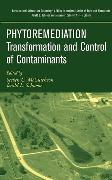Phytoremediation
BücherAngebote / Angebote:
A peerless survey of the emerging field of phytoremediation
Phytoremediation involves the use of vascular plants, algae, and fungi to remove and control waste or spur waste breakdown by microorganisms in the soil zone that surrounds and is influenced by the roots of plants. The diverse wastes that can be managed by using phytoremediation include xenobiotic organic chemicals, sewage, salts, nutrients, heavy metals, metalloids, and air pollutants. Phytoremediation: Transformation and Control of Contaminants provides an authoritative account of the history and the most recent developments of this exciting, emerging field.
Steven McCutcheon and Jerald Schnoor's insightful book defines the current state of the science of phytoremediation and points the way to further possible applications. Site managers and engineers will receive guidance in selecting plants to clean up contaminated sites cost effectively, while plant ecologists and biochemists will appreciate the nuts and bolts analysis of how phytoremediation works, and suggestions of directions for research. The editors divide their one-of-a-kind text into seven clearly defined sections for easy reference:
* Overview of Science and Applications
* Fundamentals of Phytotransformation and Control of Contaminants
* Science and Practice for Aromatic, Phenolic, and Hydrocarbon Contaminants
* Transformation and Control of Explosives
* Fate and Control of Chlorinated Solvents and Other Halogenated Compounds
* Modeling, Design, and Field-Pilot Testing
* Latest Advances
Environmental, remediation, and site engineers, site managers, plant and soil scientists, ecologists, and environmental toxicologists, chemists, and microbiologists will find Phytoremediation: Transformation and Control of Contaminants to be an invaluable addition to their professional libraries.
Folgt in ca. 15 Arbeitstagen




